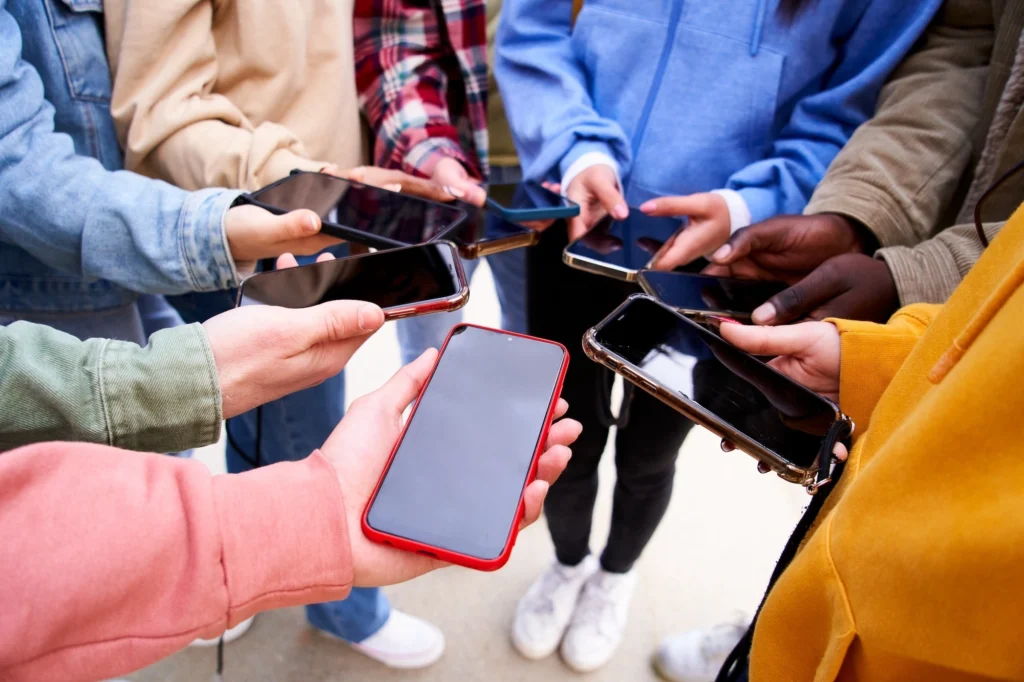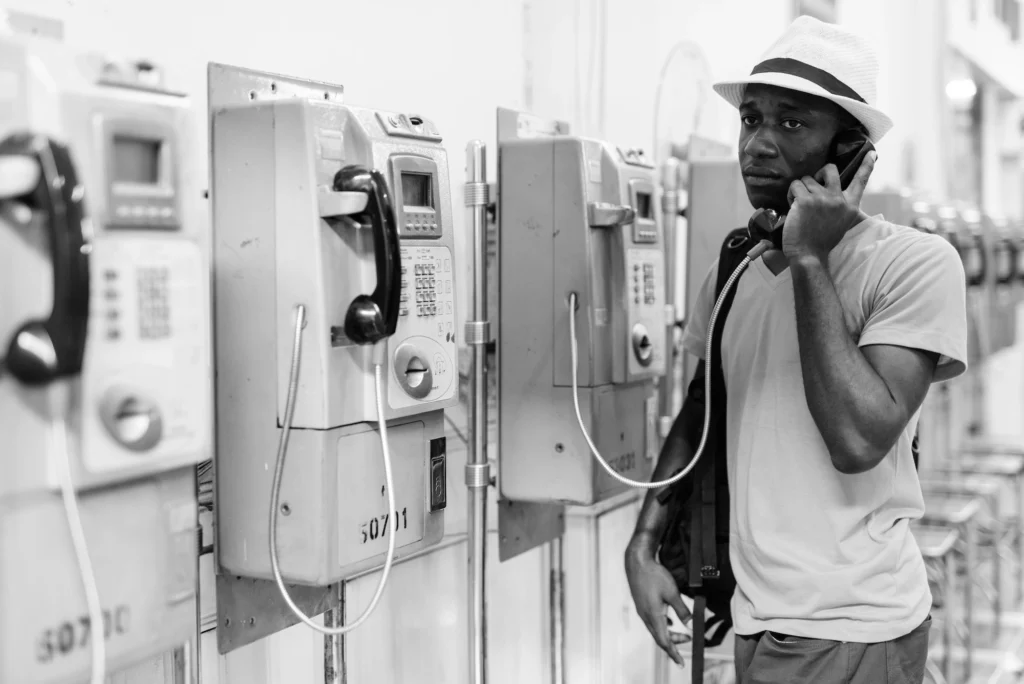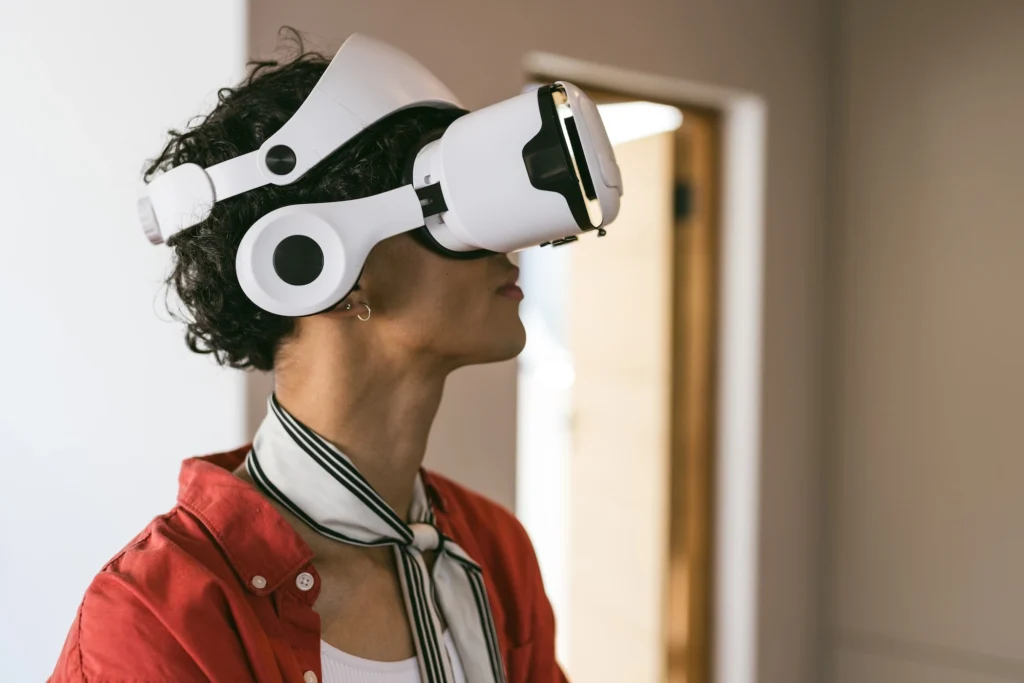Cell phones in Rehab you say? Not too long ago, using a cell phone in a drug treatment program was a big no-no. People were worried that cell phones could be used to bring drugs into the facility or to plan to leave treatment early, against medical advice (AMA). These concerns were real and important. But things have changed over the years. At Asheville Recovery Center, we now see the use of cell phones as a helpful tool in addiction recovery. Let’s talk about how this change happened, why it’s working, and why you shouldn’t pick a treatment program just because they allow cell phones.

Why Cell Phones in Rehab Were Not Allowed Before
In the past, bringing a cell phone into a drug treatment facility was not allowed for several reasons:
- Security Risks: Cell phones could be used to bring in drugs or to contact people in the outside world who might encourage drug use.
- Distractions: Electronic devices, including cell phones and laptops, could easily distract clients from focusing on their addiction recovery and treatment.
- Risk of Leaving Early: Cell phones made it easier for clients to plan to leave treatment early against medical advice (AMA).
Because of these concerns, many rehab facilities, including Asheville Recovery Center, did not allow cell phones. This rule was in place to keep everyone safe and focused on recovery.
The Old Way: Pay-phones and Limited Contact
Years ago, before cell phones became common, people in treatment had to rely on pay-phones (remember these) to stay in touch with their loved ones. These pay-phones were usually available only at certain times, often in a common area, and clients had to wait their turn. Contact with the outside world was limited, making it harder for clients to feel connected to their support networks during a challenging time. This lack of constant communication made the recovery journey feel even more isolating.

The Change: Why Cell Phones Are Allowed Now
As time went on, we learned more about addiction recovery and the role of electronic devices in our daily lives. At Asheville Recovery Center, we realized that cell phones and laptops could actually help with recovery if used the right way. In 2024, we now allow cell phones in treatment under specific rules. Here’s why this change has been good:
- Staying in Touch with Support: Recovery isn’t just about what happens inside the treatment center. Staying connected with supportive family members and friends is important. Cell phones help clients keep in touch with people in the outside world who encourage and support them during their recovery journey.
- Access to Helpful Tools: The internet is full of resources that can help with recovery, like meditation apps, recovery podcasts, access to music and online support groups. Cell phones and laptops give clients access to these tools, which can add extra support to their treatment.
- Learning and Growing: Learning about addiction, mental health, and wellness is a big part of recovery. With their cell phones, clients can find information that helps them understand their condition better and how to recover. This is especially important for clients dealing with dual diagnosis, where mental health issues like anxiety or depression occur alongside addiction. Understanding the role of dopamine in addiction, for example, can help clients recognize how their brains respond to different substances and behaviors.
- Accountability: Cell phones can also help clients stay accountable. By making phone calls to loved ones or mentors, clients can reinforce their commitment to recovery and remind themselves of the progress they’ve made.
- Relapse Prevention: Cell phones can be a powerful tool for relapse prevention. By staying connected to a support network, accessing helpful resources, and engaging in recovery-related activities, clients can use their phones to reinforce the skills and strategies they learn during the program. This ongoing connection and support can be crucial in maintaining sobriety after leaving the treatment center.
How Asheville Recovery Center Manages Cell Phone Use
Allowing cell phones in treatment wasn’t an easy decision. We had to plan carefully, set clear rules, and rely on our clinical team and treatment providers to make sure this change worked. Here’s how we manage cell phone use:
- Clear Rules: We have specific rules about cell phone use. These rules are designed to ensure that electronic devices are used responsibly and to help, not hurt, the recovery process.
- Monitoring: Our clinical team monitors how clients use their cell phones to make sure it’s helping their treatment. If a client’s cell phone use starts to cause problems, we address it quickly.
- Trust and Responsibility: Letting clients use cell phones is also about building trust and encouraging them to take responsibility for their recovery. We believe that giving clients the freedom to use their cell phones can help them take ownership of their recovery journey.
- Positive Results: Since we started allowing cell phones, the problems we feared, like using phones to bring in drugs or plan to leave early, haven’t happened. Our clinical team and treatment providers work hard to make sure cell phones are used in a positive way.

How Technology Helps People Get Clean and Sober in 2024
Today, technology plays a big role in helping people get clean and sober. Beyond cell phones, there are many other tools that can support recovery:
- Telehealth Services: Telehealth allows clients to attend therapy sessions and meet with their health care providers online. This is especially useful for outpatient treatment, where clients might not always be able to come to the center in person.
- Recovery Apps: There are many apps designed to support addiction recovery. These apps can track progress, offer daily motivational messages, and provide tools for managing cravings and stress. Some apps even offer virtual support groups, connecting people in recovery with others who share similar experiences.
- Online Education: The internet offers endless opportunities to learn more about addiction, mental health, and wellness. Clients can access courses, watch educational videos, and read articles that help them understand their condition and how to overcome it.
- Wearable Technology: Devices like fitness trackers and smartwatches can help clients monitor their physical health, which is an important part of recovery. These devices can track sleep patterns, physical activity, and even stress levels, helping clients stay mindful of their overall well-being.
- Virtual Reality Therapy: Some treatment centers are starting to use virtual reality (VR) as part of therapy. VR can create immersive experiences that help clients practice coping strategies in a controlled environment, making it a valuable tool for relapse prevention.
Don’t Choose a Treatment Program Just Because They Allow Cell Phones
While allowing cell phones in treatment has many benefits, it’s important not to choose a rehab program just because they allow cell phones. Here’s why:
- Distraction Risk: Electronic devices can become a major distraction if not managed well. In a rehab program with weak clinical programming, cell phones can lead clients to lose focus on their treatment, spending more time on social media or texting than on their recovery. Therapy sessions can be less effective if clients are distracted by their phones, which is why it’s essential that the use of these devices is carefully managed.
- Potential Misuse: If a treatment center doesn’t have clear rules and monitoring, cell phones can be misused. Clients might connect with people in the outside world who don’t support their recovery or even access substances that could harm their progress.
- False Sense of Security: Just because a rehab program allows cell phones doesn’t mean it’s the best choice. It’s more important to look at the quality of the program, the experience of the staff, and the types of therapy offered. The focus should be on the treatment options that the program provides, rather than just the ability to use a phone or laptop.
- Insurance Coverage Considerations: When choosing a treatment program, it’s also important to consider insurance coverage. Some programs may allow cell phone use but might not offer comprehensive coverage options that can make treatment affordable. Always check with your health care provider or insurance company to ensure the program you choose is covered and that you’re getting the best possible care for your needs.
Why Good Clinical Programming Matters
At Asheville Recovery Center, we know that cell phones can be helpful, but only if they’re used the right way. That’s why we focus on strong clinical programming to make sure cell phones help, not hurt, the recovery process. Here’s what makes our approach different:
- Personalized Treatment Plans: Every client at Asheville Recovery Center gets a treatment plan that fits their needs. Cell phones are included in these plans in ways that support recovery, like using an app to track progress or staying in touch with a support network through phone calls.
- Expert Clinical Team: Our clinical team and treatment providers are trained and experienced in addiction recovery. They work closely with clients to monitor cell phone use and make sure it helps their recovery. This proactive approach helps prevent problems before they start.
- Focus on Healing: Even though we allow cell phones, our main focus is on healing. We make sure cell phones are used in ways that support recovery. If a client’s cell phone use becomes a problem, we address it right away to keep them on track.
- Flexible Treatment Options: Asheville Recovery Center offers a variety of treatment options to meet the needs of different clients, including inpatient rehab, outpatient programs, and getting you into detox services. We understand that each client’s journey is unique, and we tailor our approach to fit their specific needs, including how they use their cell phones during treatment.
How to Use Cell Phones the Right Way in Treatment
If you’re thinking about detox, inpatient treatment, or outpatient rehab at Asheville Recovery Center or another facility, it’s important to know how to use cell phones in a way that helps your recovery. Here are some tips:
- Use Cell Phones for Support: Stay connected with loved ones who support your recovery. Use your cell phone to reach out when you need encouragement.
- Access Recovery Resources: Take advantage of apps, podcasts, and online support groups that help you focus on recovery.
- Limit Distractions: Try to limit your time on social media or other non-recovery-related activities. Remember, your focus should be on healing, including staying engaged during therapy sessions.
- Stay Accountable: Use your cell phone to make phone calls to mentors or sponsors to reinforce your commitment to recovery.
Conclusion: Make the Right Choice for Your Recovery
In 2024, cell phones have become a useful tool in the addiction recovery process at Asheville Recovery Center. By allowing cell phones in treatment, we help our clients stay connected, access helpful resources, and take charge of their recovery journey. But remember, phone access should not be the main reason for choosing a drug treatment program. The quality of the program, the experience of the staff, the treatment options offered, and the overall approach to recovery are far more important.
At Asheville Recovery Center, we are dedicated to providing personalized, high-quality treatment that meets the needs of each client. Whether you’re considering detox, inpatient treatment, or outpatient rehab, reach out to us today. We’ll help you understand how cell phones can be a positive tool in your recovery and guide you on the path to lasting healing.
To learn more about how we handle cell phone access please call us at: 828-237-4582






